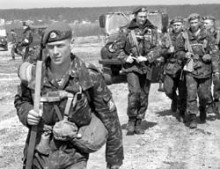The rights of the Ukrainian military, ways to increase the army’s legal awareness, and the notion of military democracy dominated the International Conference on Human Rights in Ukraine’s Army held in Kyiv under the aegis of the European Commission. Its organizers consider the problems of legal education of the military especially relevant now that a defense reform is underway, to turn Ukraine’s Armed Forces into a competitive force structured according to the principles of EU and NATO member states. Another factor is the growing international role of the Ukrainian military, with the new goals in the country’s foreign policy requiring the presence of our peacekeepers in the world’s hot spots, where Ukrainians work hand in hand with the military of the world’s greatest democracies. Innovations in international military law require our Armed Forces to meet the contemporary criteria of a combat-ready army. Notably, not only mobility and state of the art materiel determine the effectiveness of a contemporary army. The army must be a thinking formation. Now that it has embarked on a defense reform, Ukraine faces the challenge of not only reducing the army’s strength, upgrading and making it mobile, but also that of increasing its legal awareness.
This has become the underlying principle of International Law and Domestic Legislation on the Fundamentals of Democracy and Human Rights in Ukraine’s Army, a three-year project (2001-2004) funded by the European Commission and implemented by the International Association for Human Rights and Ukraine’s Defense Ministry with the assistance of the OSCE. The overriding goal of the project has been to arm Ukraine’s military with legal knowledge. It has envisioned the creation of the so- called system of legal self-defense in Ukraine’s army to foster active and conscious use by the military of all the available national and international legal instruments. To this end, thirty seminars for officers have been held in thirty cities across Ukraine, while cadets at ten military institutes attended lectures on the fundamentals of the legal defense of servicemen. A permanent information resource has been created. Officers have received handbooks with the relevant international treaties and selected Ukrainian laws. A special pocketsize booklet for current and future conscripts has been published outlining the basics of democracy and human rights in Ukraine’s army.
The EC, which provided 450,000 euros for the project, called it a major lesson in democracy for Ukraine. According to EC representative Rozalina Pullizi, this project will help to strengthen in the future the strategic relationship between Ukraine and the EU, since the most important task of the day is to adapt Ukraine’s legislation to that of the EU. “Such changes will bring Ukraine closer to European standards,” Ms. Pullizi is convinced.
The idea to increase the legal awareness of Ukraine’s military did not escape the attention of the OSCE, which was also a partner in the project. To quote OSCE Projects Coordinator in Ukraine David Nicholas, this is Kyiv’s major step on the thorny path of European integration. “The OSCE supports Ukraine on its way to the EU and NATO. Our role is to support. We see our responsibility in helping Ukraine to achieve its goal,” he noted.
The idea to bring democracy into Ukraine’s army was rated highly by project coordinator and International Association for Human Rights consultant for legal defense in the army Wolfhard Saul (Koblenz, Germany). In his view, “The political prestige of any army depends not only on the technical level of its materiel” but above all on whether it respects human rights. The concept of the human being must come first in the army. “There is no such military need that would justify violations of human rights. Even the strictest military discipline does not run counter to human rights. This is a principle of military democracy,” Mr. Saul is convinced. Meanwhile, military democracy must be regulated by the law. Saul observed that Ukraine’s army is undergoing fundamental transformations, and the process of its formation will be long and possibly painful. Yet, as he put it, “I wish other European countries showed as much a craving for change and fundamental self-analysis that Ukraine now shows in various spheres.”
Yet the statistics seem less optimistic. According to Volodymyr Mukhin of the secretariat of the human rights ombudsperson in Verkhovna Rada, they receive over 300 and sometimes as many as 500 complaints a day about human rights violations in the army. Notably, they come mostly from officers and not enlisted men. Another important question that troubles the public is whether it is possible to observe human rights in the army at a time when they are not always observed in society and when the army belongs to a state, which is still a long way from being law-governed. “These are interconnected things,” International Association for Human Rights member Fred Anadenko is convinced. Thus, the problem of legal defense in Ukraine will have to be approached in a complex way.







